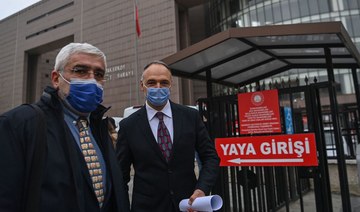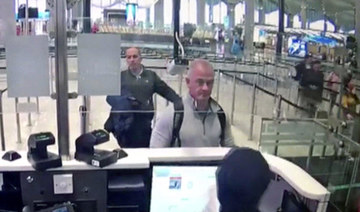BOSTON: An American father and son wanted by Japan for aiding former Nissan Motor Co. Chairman Carlos Ghosn escape from the country in a box were handed over to Japanese custody Monday, ending their months-long battle to stay in the US
Michael Taylor and his son, Peter Taylor, failed to convince US officials and courts to block their extradition to Japan, where they will be tried on charges that they smuggled Ghosn out of the country in 2019 while the former auto titan was awaiting trial on financial misconduct charges.
The Massachusetts men, who have been locked up at a suburban Boston jail since their arrest in May, were handed over to Japanese officials early Monday, said one of their attorneys, Paul Kelly.
The Taylors’ lawyers had argued the accusations don’t fit under the law Japan wants to try them under and that they would be treated unfairly in Japan and subjected to “mental and physical torture.” They have accused Japan of pursuing the pair in an attempt to save face after the embarrassment of Ghosn’s escape.
Michael Taylor, a US Army Special Forces veteran and private security specialist who in the past was hired by parents to rescue abducted children, has never denied the allegations.
He gave an interview to Vanity Fair magazine for a story last year in which he described the mission in detail. When asked why he did it, he responded with the motto of the Special Forces: “De oppresso liber” or “to liberate the oppressed,” the magazine reported.
Michael Taylor refused to discuss the details of the case in an interview last month with The Associated Press because of the possibility that he will be tried in Japan. But he insisted that his son wasn’t involved and was not even in Japan when Ghosn left.
Ghosn, who became one of the auto industry’s most powerful executives by engineering a turnaround at the Japanese manufacturer, had been out on bail after his November 2018 arrest on charges that he underreported his future income and committed a breach of trust by diverting Nissan money for his personal gain.
Ghosn has denied the allegations and has said he fled to avoid “political persecution.”
Prosecutors have described it as one of the most “brazen and well-orchestrated escape acts in recent history.” Authorities say the Taylors were paid at least $1.3 million for their help.
On the day of the escape, Michael Taylor flew into Osaka on a chartered jet with another man, George-Antoine Zayek, carrying two large black boxes and pretending to be musicians with audio equipment, authorities said. Meanwhile, Ghosn, free on bail, headed to the Grand Hyatt in Tokyo and met up with Peter Taylor, who was already in Japan, authorities say.
The elder Taylor and Zayek met up with the two others at the Grand Hyatt and shortly after, they split up. Peter Taylor hopped on a flight to China while the others got on a bullet train and went back to another hotel near the airport, where Taylor and Zayek had booked a room. They all went in; only Ghosn’s rescuers were seen walking out.
Authorities say Ghosn was inside one of the big black boxes. At the airport, the boxes passed through a security checkpoint without being checked and were loaded onto a private jet headed for Turkey, officials said.
The Taylors had hired lawyers connected to former President Donald Trump, including ex-White House attorney Ty Cobb, in attempt to get Trump to block the extradition before he left office.
In his interview with the AP, Michael Taylor implored President Joe Biden to step in and said he felt betrayed that the US would try to turn him over to Japan after his service to the country. But the Biden administration declined to block the extradition.
Under Trump. the US State Department agreed in October to hand the men over to Japan. But a federal judge in Boston put their extradition on hold shortly after their lawyers filed an emergency petition. The judge rejected their petition in January and the Boston-based 1st Circuit Court of Appeals later denied their bid to put the extradition on hold while they appeal that ruling.
Supreme Court Justice Stephen Breyer last month denied a bid for more time for an appeal, clearing the way for the men to be handed over to Japan.
2 Americans wanted in Ghosn’s escape in Japanese custody
https://arab.news/msvmy
2 Americans wanted in Ghosn’s escape in Japanese custody
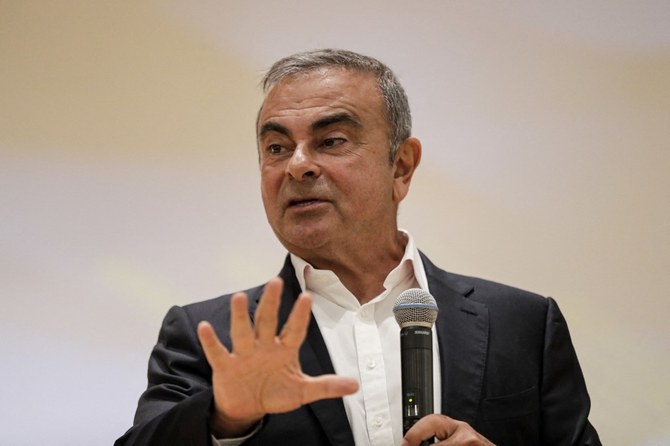
- American father and son helped former Nissan chairman escape Japan in a box
- Michael and Peter Taylor, failed to convince US courts to block their extradition
Somalia detains US-trained commandos over theft of rations
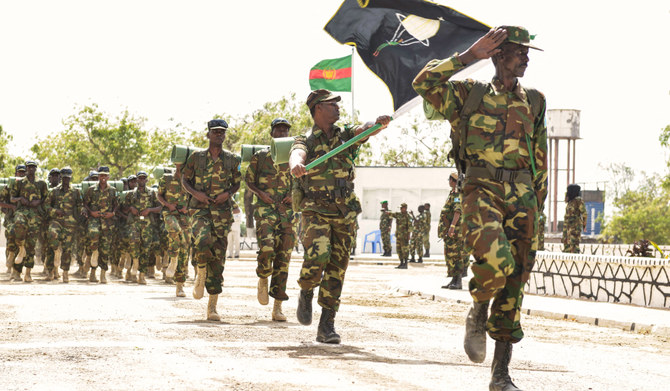
- The US agreed in 2017 to help train and equip the 3,000-strong Danab to act as a quick-reaction strike force against Al-Shabab
MOGADISHU: Somalia’s government said it had suspended and detained several members of an elite, US-trained commando unit for stealing rations donated by the US, adding that it was taking over responsibility for provisioning the force.
The Danab unit has been a key pillar of US-backed efforts to combat the Al-Qaeda-linked militant group Al-Shabab. The US agreed in February to spend more than $100 million to build up to five military bases for Danab.
Somalia’s Defense Ministry said in a statement that it had notified international partners of the theft and would share the outcome of its investigation.
A US official said in a statement to Reuters that Washington takes all corruption accusations seriously.
“We look forward to engaging with the Danab on creating the necessary safeguards and accountability measures to prevent future incidents that could affect future assistance,” the official said, without directly addressing whether any US support had already been suspended.
The US agreed in 2017 to help train and equip the 3,000-strong Danab to act as a quick-reaction strike force against Al-Shabab.
The group has been waging an insurgency against the central government since 2006.
Danab has been heavily involved in a military offensive by the Somali military and allied clan militias since 2022 that initially succeeded in wresting swaths of territory from Al-Shabab in central Somalia.
However, the campaign has lost momentum, with the government-allied forces struggling to hold rural areas and Al-Shabab continuing to stage large-scale attacks, including in the capital Mogadishu.
Washington suspended some defense assistance to Somalia in 2017 after the military could not account for food and fuel.
The US also conducts frequent drone strikes targeting Al-Shabab militants.
Kenya flood death toll since March climbs to 70

- Tanzania Prime Minister Kassim Majaliwa said on Thursday that more than 200,000 people had been affected by the disaster, with 155 fatalities and 236 people injured
NAIROBI: The number of people killed in floods in Kenya due to heavier than usual rainfall since the start of the monsoon in March has risen to 70, a government spokesperson said on Friday.
In recent weeks, Kenya and other countries in East Africa — a region highly vulnerable to climate change — have been pounded by heavier-than-usual rainfall compounded by the El Nino weather pattern.
El Nino is a naturally occurring climate pattern typically associated with increased heat worldwide, leading to drought in some parts of the world and heavy rains elsewhere.
BACKGROUND
Kenyans have been warned to stay on alert, with the forecast for more heavy rains across the country in the coming days as the monsoon batters East Africa.
“The official tally of fellow Kenyans who regrettably have lost their lives due to the flooding situation now stands at 70 lives,” government spokesperson Isaac Mwaura said on X after torrential rains killed more than a dozen people in the capital, Nairobi, this week.
Mwaura said the government would issue a “comprehensive brief” following a meeting with the national emergency response committee after the extreme weather caused chaos across Nairobi this week, blocking roads and engulfing homes in slum districts. Kenyans have been warned to stay on alert, with the forecast for more heavy rains across the country in the coming days as the monsoon batters East Africa.
At least 155 people have died in neighboring Tanzania due to flooding and landslides.
Tanzania Prime Minister Kassim Majaliwa said on Thursday that more than 200,000 people had been affected by the disaster, with 155 fatalities and 236 people injured.
He said homes, property, crops, and infrastructure such as roads, bridges, railways, and schools had been damaged or destroyed.
In Burundi, one of the poorest countries on the planet, around 96,000 people have been displaced by months of relentless rains, the United Nations and the government said this month.
Meanwhile, the UN humanitarian response agency, OCHA, said in an update this week that in Somalia, the seasonal Gu rains from April to June are intensifying, with flash floods reported since April 19.
It said four people had been reportedly killed and more than 800 people affected or displaced nationwide.
Uganda has also suffered heavy storms that have caused riverbanks to burst, with two fatalities confirmed and several hundred villagers displaced.
Late last year, more than 300 people died in torrential rains and floods in Kenya, Somalia, and Ethiopia, just as the region was trying to recover from its worst drought in four decades that left millions of people hungry.
From October 1997 to January 1998, massive flooding caused more than 6,000 deaths in five countries in the region.
Jewish campaign group led by Gideon Falter cancels London march over safety concerns

- The Campaign Against Antisemitism says safety concerns forced it to call off its “Walk Together” march after receiving threats from ‘hostile actors’
- Last weekend, a video appeared to show police prevent ‘openly Jewish’ Falter from walking near a pro-Palestine protest but a longer version of the footage painted a different picture
LONDON: The organizers of a march in protest against antisemitism, planned for Saturday in London, “reluctantly” announced on Friday that they were canceling the demonstration.
The Campaign Against Antisemitism said it was forced by safety concerns to call off its “Walk Together” march, which was scheduled to coincide with the latest in a series of pro-Palestine marches in the British capital. The organization said it had expected thousands of people to take part but threats from “hostile actors” posed a safety risk.
“We have received numerous threats and our monitoring has identified hostile actors who seem to have intended to come to any meeting locations that we announced,” the CAA said.
“The risk to the safety of those who wished to walk openly as Jews in London tomorrow as part of this initiative has therefore become too great.
“We are no less angry about these marches than our Jewish community and its allies. We want to walk.”
The group added that it wants the Metropolitan Police not only to “manage marches” but “police” them.
Last weekend, a video that circulated on social media sparked controversy as it showed a confrontation between the CAA’s chief executive, Gideon Falter, and a Metropolitan Police officer who appeared to be preventing him from crossing the road in the vicinity of a pro-Palestine march in London because he was “openly Jewish” and his presence was “antagonizing.”
Falter, who was threatened with arrest if he did not leave the area, criticized the police for their actions during the incident and claimed there were now “no-go zones for Jews” in London amid a rise in antisemitic sentiment arising from Israel’s war on Gaza following the Oct. 7 attacks by Hamas.
Police chiefs apologized twice for the officer’s choice of words. However, a former senior police officer said on Monday that the initial, short version of the video most people saw online “did not fully represent the situation.”
A longer version showed the officer expressing concern about Falter’s actions because he appeared to be deliberately attempting to provoke the pro-Palestinian demonstrators.
Berlin police clear pro-Palestinian camp from parliament lawn

- Police dismantled tents, forcibly removed protesters and blocked the surrounding area to stop others arriving
- "The idea was to draw attention to that and ... to the German complicity and active enabling of the Israeli genocide in Gaza," the camp organizer, Jara Nassar, said
BERLIN: Berlin police on Friday began clearing a pro-Palestinian camp set up in front of the German parliament by activists demanding the government stop arms exports to Israel and end what they say is the criminalization of the Palestinian solidarity movement.
Police dismantled tents, forcibly removed protesters and blocked the surrounding area to stop others arriving.
The action followed clashes between demonstrators and police on US campuses and a blockade at Paris’s Sciences Po university, part of international protests to decry Israel’s military campaign in Gaza and Western support for Israel.
The Berlin camp ‘Besetzung Gegen Besatzung’ — ‘Occupy Against Occupation’ — began on April 8, coinciding with the start of International Court of Justice hearings in Nicaragua’s case against Germany for providing military aid to Israel.
“The idea was to draw attention to that and ... to the German complicity and active enabling of the Israeli genocide in Gaza,” the camp organizer, Jara Nassar, told Reuters.
Israel strongly denies accusations that its offensive in Gaza, which aims to destroy the Palestinian militant group Hamas, constitutes a genocide.
Nassar and a dozen protesters sat on the ground, chanting pro-Palestinian slogans and songs as police with loudspeakers called on them to leave.
“We look at what is happening in the US ... with admiration. There is no reason to believe we should stop now,” said Udi Raz, a PhD student at Berlin’s Free University and a member of the Jewish Voice association.
Raz, who wore a Jewish kippah with the Palestinian flag colors and held his phone in a live social media broadcast of the clearance, said Jewish activists had joined the camp and held a candle-lit Passover dinner there this week.
Police said the prohibition order for the camp, which had been granted authorization at the start of the protest, was due to repeated violations committed by some protesters, including the use of unconstitutional symbols and forbidden slogans.
“Protection of gatherings cannot be guaranteed at this point because public safety and order are significantly at risk,” police spokesperson Anja Dierschkesaid said, adding tents had to be moved daily under local regulations to maintain the lawn.
“For the German government, grass matters more than the lives of more than 40,000 innocent people in Gaza murdered by the Israeli military,” Raz said.
Philippine police kill an Abu Sayyaf militant implicated in 15 beheadings and other atrocities
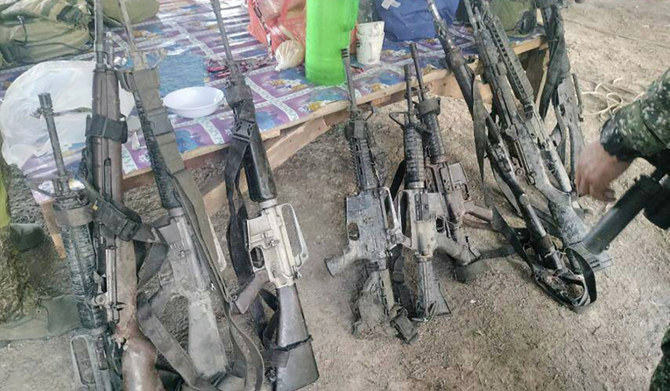
- A confidential police report said that Abdulsaid had been implicated in at least 15 beheadings in Basilan, including of 10 Philippine marines in Al-Barka town in 2007 and two of six kidnapped Vietnamese sailors near Sumisip town in 2016
MANILA: Philippine forces killed an Abu Sayyaf militant, who had been implicated in past beheadings, including of 10 Filipino marines and two kidnapped Vietnamese, in a clash in the south, police officials said Friday.
Philippine police, backed by military intelligence agents, killed Nawapi Abdulsaid in a brief gunbattle Wednesday night in the remote coastal town of Hadji Mohammad Ajul on Basilan island after weeks of surveillance, security officials said.
Abu Sayyaf is a small but violent armed Muslim group, which has been blacklisted by the US and the Philippines as a terrorist organization for ransom kidnappings, beheadings, bombings and other bloody attacks. It has been considerably weakened by battle setbacks, surrenders and infighting, but remains a security threat particularly in the southern Philippines, home to minority Muslims in the predominantly Roman Catholic nation.
Abdulsaid, who used the nom de guerre Khatan, was one of several Abu Sayyaf militants who aligned themselves with the Daesh group.
A confidential police report said that Abdulsaid had been implicated in at least 15 beheadings in Basilan, including of 10 Philippine marines in Al-Barka town in 2007 and two of six kidnapped Vietnamese sailors near Sumisip town in 2016. The Vietnamese were seized from a passing cargo ship.
He was also involved in attacks against government forces in 2022 and a bombing in November that killed two pro-government militiamen and wounded two others in Basilan, the report said.
Abdulsaid was placed under surveillance in February, but police forces couldn’t immediately move to make a arrest because of the “hostile nature” of the area where he was eventually gunned down, according to the report.
On Monday, Philippine troops killed the leader of another Muslim rebel group and 11 of his men blamed for past bombings and extortion in a separate clash in a marshy hinterland in Datu Saudi Ampatuan town in southern Maguindanao del Sur province, the military said.
Seven soldiers were wounded in the clash with the members of the Bangsamoro Islamic Freedom Fighters.
The Abu Sayyaf and the Bangsamoro Islamic Freedom Fighters are among a few small armed groups still struggling to wage a separatist uprising in the southern Philippines.
The largest armed separatist group, the Moro Islamic Liberation Front, signed a 2014 peace pact with the government that eased decades of sporadic fighting.
Moro Islamic Liberation Front rebel commanders became parliamentarians and administrators of a five-province Muslim autonomous region in a transition arrangement after signing the peace deal. They are preparing for a regular election scheduled for next year.



